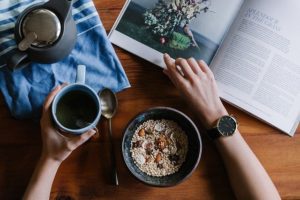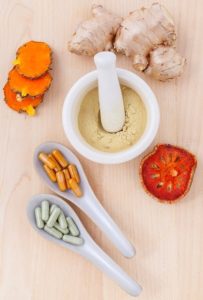3 Ways To Keep Your Home & Gut Healthy

Keeping your home & gut healthy can involve some of the same steps! In the book “Never Home Alone,” biologist Rob Dunn says that we’ve done a fantastic job controlling the pathogens in our home environment (1). However, we’ve inadvertently gone too far and killed off all the beneficial species. Next, we built our homes in ways that favor problem species like fungi, new pathogens living in our faucets, or cockroaches living in our kitchens. He says there was always another way – that is to nurture the beneficial species in our homes (1).
Just like our gut biome, our home has a biome as well. Although the home biome is somewhat different than our guts, the same principles apply. Nurture the good species while removing whatever nurtures the bad. Experts say that we ought to focus efforts on the good microbes instead of killing off the harmful microbes. This is because whenever we kill off bad microbes, we usually kill the good guys too.

To care for our gut biome, there are three main principles we need to follow: eat healthy, take probiotics, and take pathogen-killing medicine when absolutely required. It turns out that caring for the home biome follows very similar principles. Let’s look at each of these principles and how nurturing our home biome is similar to nurturing our gut biome.
 1. Eat a Healthy Diet
1. Eat a Healthy Diet
Keeping your home & gut healthy means keeping them nourished. Eating healthy for our gut biome means that we are feeding the good microbes with foods they like. Harmful microbes tend to like sugars, starches, and processed foods. In contrast, good bacteria and microbes like to eat fermented fibrous items like fruits and veggies. The idea is to enhance the growth of good bacteria and microbes, which will naturally balance out the gut microbiome (2).
The same can be said for our home biome. Good microbes consist of more soil-based bacteria and microbes, which we don’t often find in modern homes (3,4). Over the last half a century, we’ve become so averse to dirt that we have created a home environment favoring human microbes and pathogens. Research shows that when we began actively removing microbes and building airtight living spaces cut off from nature that we inadvertently favored a biome that lacks healthy microbes (1,3,4,5). At the same time, many illnesses developed, such as asthma, allergies, and autoimmune diseases. We’ve also made our immune systems more susceptible to other illnesses as well (1,6).
Over the last half a century, we’ve become so averse to dirt that we have created a home environment favoring human microbes and pathogens. Research shows that when we began actively removing microbes and building airtight living spaces… Share on XSo the first step in nurturing our home biome is to feed the good guys in our homes. We do this by allowing our environment to find its own natural balance without using harsh cleansers, cleaning too frequently, and avoiding any and all dirt. The truth is, good microbes will eat and compete with harmful microbes if we let them be. Good microbes also have a symbiotic relationship with our human and pet microbes, and we must nurture that relationship as well (1,3,4,5).
 2. Take Probiotics
2. Take Probiotics
Keeping your home & gut healthy sometimes requires calling in reinforcements. The other way we can nourish and promote good microbes in our homes is to actually add them to our environment the same way we do in our guts. It looks a little different between the gut and the home biome, but the principle is much the same.
Probiotics for our guts involve taking probiotic pills or ingesting foods like sauerkraut, kimchi, kombucha, and kefir (2). As science and human technology advances, we are discovering ways to add probiotics to our home environments (7).
A research study done in a healthcare setting shows that probiotic microorganisms may help decrease the growth of harmful pathogens. Probiotics and their biosurfactant products may keep hospital-based infections under control. Since this works in a hospital setting, it may indeed work well at home (7). This is excellent news amidst a pandemic where we need to clean our homes with harsh chemicals more often.
This is where Homebiotic Probiotic Spray comes in to create a population of beneficial microbes within your home. Include Homebiotic as a treatment at the end of your regular natural cleaning routine to create a barrier of probiotic protection on surfaces in your home, keeping them clean long after chores are done.
 3. Take Pathogen-Killing Medicine Only When Absolutely Required
3. Take Pathogen-Killing Medicine Only When Absolutely Required
Keeping your home & gut healthy can mean minimizing the intake of antibiotics. In the last few decades, we’ve discovered that antibiotics and other chemical irritants can kill off the beneficial microbes in our gut. Even things like stress, massive change, and unhealthy food choices can negatively affect our gut biome. Now that we know this, many health officials are advocating for the discretionary use of antibiotics. There’s also been an increase in education around foods, chemicals, and stress and how they negatively impact the gut biome (1).
It turns out that the same is true for the home biome. Research shows that over-cleaning, using harsh antibacterial cleansers has a devastating effect on beneficial microbe species in the home. As we discussed above, creating a sterile environment in the house has led to the development of many new illnesses (1,3-6). This is because we need beneficial bacteria in both our guts and our homes to stay healthy.
Research shows that over-cleaning, using harsh antibacterial cleansers has a devastating effect on beneficial microbe species in the home Share on XSo in order to nurture our home biome, we need to decrease our use of harsh cleansers and reduce our cleaning frequency. This is not to say to leave our homes dirty and full of grime. Rather, we allow some microscopic dirt to remain and clean in ways that don’t destroy beneficial species. Instead of using antibacterial cleansers, we can choose essential oils, small amounts of vinegar and opt for surface wiping and removing excessive dust (1,4,5,6).
Conclusion
In conclusion, it seems that nurturing our home biome is quite similar to promoting health for our gut biomes. As we are biological beings that live symbiotically in a connected biosphere, it makes sense that our home and gut biomes would behave in similar ways.
There are three main points to keep your home & gut healthy:
- We need to feed the good microbes while starving out the bad ones.
- We add in good microbes when necessary to help repopulate and bring balance to the biome.
- Be careful with how we treat overgrowths of harmful microbes.
When we don’t need to kill any harmful pathogens, then it makes sense not to use harsh pathogen-killing chemicals if it’s unnecessary.
As we become more familiar with our gut biome, it makes sense to look at the entire biome we live in, including our home. The principles for nurturing any biome are relatively similar. The more we understand, the better we can be at fostering our overall health and wellbeing.
References
https://robdunnlab.com/science-portfolio/never-home-alone/
https://www.wholebodymicrobiome.com
https://journals.plos.org/plosone/article?id=10.1371/journal.pone.0064133
https://royalsocietypublishing.org/doi/full/10.1098/rspb.2015.1139
https://www.sciencedirect.com/science/article/abs/pii/S1471490615000022
